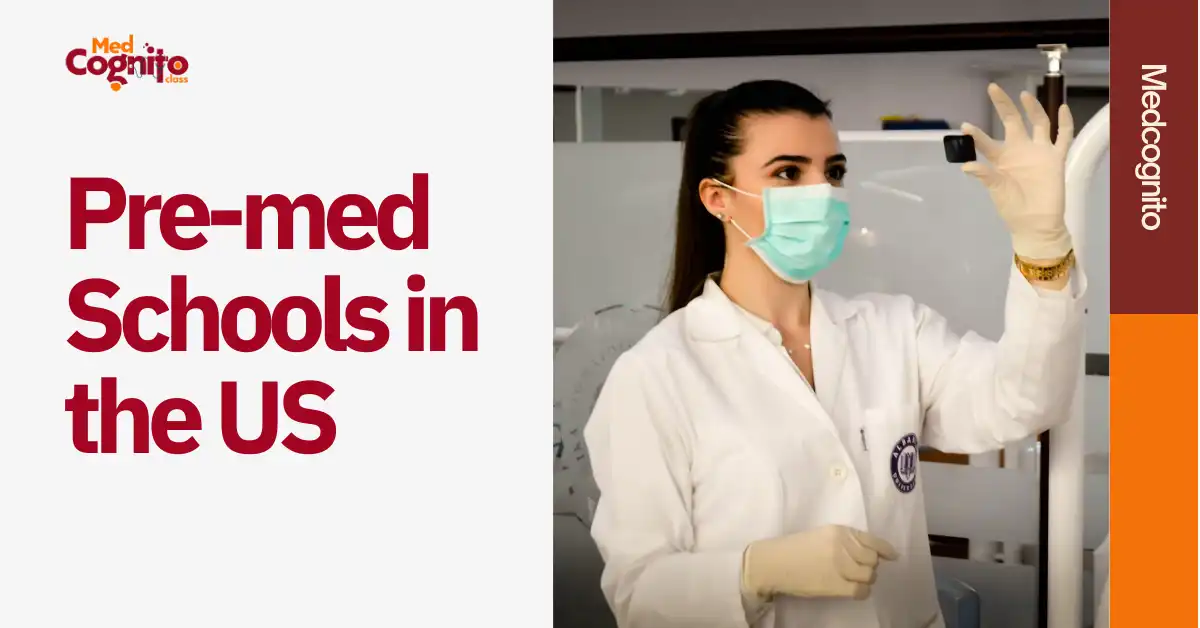If you’re aspiring to become a doctor, choosing out of the many pre-med schools is one of the most critical decisions you’ll make. A strong pre-med program not only provides a solid academic foundation but also offers research opportunities, clinical exposure, and expert advising to help you navigate the competitive medical school admissions process.
To ensure you make an informed decision, we’ve compiled a list of the best pre-med colleges based on academic excellence, resources, and medical school acceptance rates.
Table of Contents
ToggleTop Pre-Med Colleges in the U.S.
1. Harvard University
Harvard University offers a highly structured pre-med advising program, ensuring students receive tailored guidance from sophomore to senior year. With strong biological sciences departments and proximity to renowned hospitals, Harvard provides abundant research and clinical experience opportunities.
- Location: Boston, MA
- Acceptance Rate: 3.5%
- Avg ACT Score: 34-36
- Avg SAT Score: 1550
- Tuition: $56,550
- Medical School Acceptance Rate: 95%
2. Northwestern University
Northwestern’s Health Professions Advising Office provides workshops and events designed to prepare students for medical school applications. It also has a strong track record of sending students to top medical schools.
- Location: Evanston, IL
- Acceptance Rate: 7%
- Avg ACT Score: 33-35
- Avg SAT Score: 1490-1580
- Tuition: $67,158
3. Georgetown University
Georgetown University offers an assured admission program for high-performing undergraduates, allowing them to bypass the MCAT and gain direct admission to Georgetown University School of Medicine if they meet academic criteria by the end of their sophomore year.
- Location: New York, NY
- Acceptance Rate: 4%
- Avg ACT Score: 34-35
- Avg SAT Score: 1524
- Tuition: $71,170
- Medical School Acceptance Rate: 91%
4. Columbia University
Columbia’s pre-med curriculum aligns with most medical school prerequisites. The university hosts informational sessions through its Premedical Committee, equipping students with the tools they need for medical school applications.
- Location: New York, NY
- Acceptance Rate: 4%
- Avg ACT Score: 34-35
- Avg SAT Score: 1524
- Tuition: $71,170
- Medical School Acceptance Rate: 91%
5. Yale University
Yale offers a flexible pre-med curriculum with a strong emphasis on interdisciplinary studies. The university provides extensive research opportunities, making it an excellent choice for students looking to gain hands-on experience.
- Location: New Haven, CT
- Acceptance Rate: 5%
- Avg ACT Score: 33-35
- Avg SAT Score: 1500-1580
- Tuition: $67,250
- Medical School Acceptance Rate: 88%
6. Duke University
Duke is a research powerhouse, offering health-centered study abroad programs and exceptional pre-med support. Its medical school ranks among the top in the nation, providing undergraduates with valuable networking opportunities.
- Location: Durham, NC
- Acceptance Rate: 7%
- Avg ACT Score: 34-35
- Avg SAT Score: 1520-1570
- Tuition: $66,326
7. Johns Hopkins University
Johns Hopkins University is synonymous with medical excellence. With ample research opportunities and a comprehensive pre-med advising track, it’s a premier choice for aspiring medical professionals.
- Location: Baltimore, MD
- Acceptance Rate: 8%
- Avg ACT Score: 34-35
- Avg SAT Score: 1530-1580
- Tuition: $64,730
- Medical School Acceptance Rate: 97%
8. University of Pennsylvania
UPenn’s Perelman School of Medicine provides undergraduates with extensive research opportunities. The university also offers specialized pre-med career services to guide students throughout their journey.
- Location: Philadelphia, PA
- Acceptance Rate: 6%
- Avg ACT Score: 34-35
- Avg SAT Score: 1500-1570
- Tuition: $60,920
- Medical School Acceptance Rate: 76%
9. Stanford University
Stanford provides personalized pre-med advising, access to top-tier research facilities, and a robust mentorship program. It is a great option for students looking to engage in groundbreaking medical research.
- Location: Stanford, CA
- Acceptance Rate: 4%
- Avg ACT Score: 34-35
- Avg SAT Score: 1510-1580
- Tuition: $65,127
10. University of North Carolina at Chapel Hill
UNC-Chapel Hill offers specialized pre-med training tracks, allowing students to tailor their studies toward research or clinical experience. The university also offers an intensive 9-week pre-med preparatory program.
- Location: Chapel Hill, NC
- Acceptance Rate: 19%
- Avg ACT Score: 30-34
- Avg SAT Score: 1370-1530
- Tuition: $7,020 (in-state), $43,152 (out-of-state)
- Medical School Acceptance Rate: 90%
Pre-Med Course Requirements: What You Need to Know
Medical school admissions vary by institution, but most require a core set of science and general education courses to ensure students have a strong academic foundation.
Essential Pre-Med Courses
To meet the prerequisites for most medical schools, students typically need to complete the following:
- Biology – 2 courses with labs
- Physics – 2 courses with labs
- General Chemistry – 2 courses with labs
- Organic Chemistry – 2 courses with labs
- Biochemistry – 1 course
- English – 2 courses
- Mathematics – 2 courses
Additionally, many medical schools require or strongly recommend courses in:
- Statistics
- Psychology
- Writing & Composition
Since specific requirements can vary, it’s crucial to review the admissions criteria of the medical schools you plan to apply to, ensuring you meet any unique prerequisites.
Recommended Pre-Med Courses
While not always mandatory, these courses can strengthen your medical school application and provide valuable knowledge for future coursework:
- Genetics
- Statistics
- Calculus
- Ethics
- Public Health
- Human Anatomy & Physiology
- Psychology & Sociology
Popular Majors for Pre-Med Students
Pre-med is not a standalone major, so students must choose a degree program that incorporates medical school prerequisites. Many opt for science-focused fields that align naturally with these requirements, including:
- Biology
- Physics
- Chemistry
- Psychology
- Economics
- Social Sciences
- Mathematics
Additional Medical School Requirements
Beyond coursework, medical schools evaluate applicants on multiple factors, including:
- MCAT Scores & GPA – Competitive scores and grades play a crucial role in admissions.
- Personal Statement – A well-written essay explaining your motivation for pursuing medicine.
- Letters of Recommendation – Strong endorsements from professors or professionals in the field.
- Extracurricular Activities – Clinical experience, research, volunteering, and leadership roles enhance your application.
Factors to Consider When Choosing a Pre-Med Program
When selecting a pre-med college, consider the following:
1. Faculty-to-Student Ratio
Smaller class sizes ensure personalized attention and strong recommendation letters from professors, which are crucial for medical school applications.
2. Research & Clinical Opportunities
Medical schools value hands-on experience. Look for schools with strong affiliations with hospitals and research centers.
3. Financial Aid & Scholarships
Medical education is expensive, so choosing a pre-med school that offers generous financial aid packages can ease your financial burden.
4. MCAT Preparation Support
Some universities offer MCAT preparation programs, which can be a significant advantage when preparing for medical school admissions.
5. Medical School Acceptance Rate
While published acceptance rates are helpful, they don’t always tell the full story. Research alumni experiences and school support for pre-med students.
Final Thoughts
Choosing the right pre-med college is a crucial step toward your medical career. Each of these institutions provides excellent academic preparation, research opportunities, and medical school guidance.
Make sure to consider your personal preferences, financial situation, and career goals before making your decision.
Next Steps:
- Visit the official website of these schools.
- Research each school’s pre-med advising and support systems.
- Look into financial aid options to determine affordability.
- Explore extracurricular activities like research internships, clinical volunteering, and study abroad programs to strengthen your med school application.
By selecting the right pre-med program, you’ll set yourself up for success in medical school and beyond!
Frequently Asked Questions
What is the #1 pre-med school in the US?
Harvard University is the best pre-med school in the U.S. because of its top-ranked biological sciences program, a 95% medical school acceptance rate, and strong pre-med advising. Students have access to world-class research and clinical opportunities at affiliated hospitals like Massachusetts General.
What is the best pre-med major for med school?
The most popular pre-med majors are biochemistry and microbiology. These fields focus on how living organisms function, providing a strong foundation for medical school. Their emphasis on biological processes, lab research, and critical thinking skills makes them ideal for aspiring doctors.
What is the most accepted pre-med major?
Biological sciences is the most popular pre-med major, with 57% of MCAT test takers having a background in biology. Other pre-med majors from different categories, such as social sciences and physical sciences, follow closely behind in popularity.
Is a 3.6 GPA good for pre-med?
A GPA of 3.5 or higher is ideal for medical school admissions. You remain competitive if your GPA is within 0.1 points of a school’s average. However, if your GPA falls more than 0.3 points below the average or below the school’s 75th or 80th percentile, it may be considered low.



